
|
TEACHINGS
JORAM AND JEHORAM

Note: you will need the oldheb.ttf (old Hebrew) and the SGreek Mediuim fonts to see the Hebrew and Greek text, as well as the three English fonts: Cooper Black, Impact and Frontlight MT Light. Right click the links and choose "Save Target As". Then go to the file, and either right click them and choose "install", or drag them into the font page.
oldheb.ttf
SGreek Medium
Cooper Black
Impact
Frontlight MT Light
I have been puzzled for years regarding these two names of these two kings. One of them was the king of Judah and the other the king of Northern Israel. Both were kings in their contemporary time period. I have been researching both of them and started to come up with a theory that I don't think anyone considered.
SCRIPTURE SOURCES OF THE TWO JORAMS/JEHORAMS
This chart reveals scripture references of Joram and Jehoram as King of Judah, and Joram and Jehoram as King of Northern Israel in that generation. Note: you have to look at the Hebrew to see the correct names, because there are English versions of the Bible that altered some of the names to fit the same kingship: i.e. 2 Kings 9:15 in the English KJV has Joram, but in the Hebrew it has Jehoram. I will note the English from the KJV if it is different from the Hebrew.
| Joram,
King of Judah |
Jehoram,
King of Judah |
Joram,
King of Northern Israel |
Jehoram,
King of Northern Israel |
| 1 Ki 22:50 | |||
| 2 Ki 1:17 | 2 Ki 1:17 | ||
| 2 Ki 3:1 | |||
| 2 Ki 3:6 | |||
| 2 Ki 8:16 | 2 Ki 8:16 | ||
| 2 Ki 8:21 | |||
| 2 Ki 8:23 | |||
| 2 Ki 8:24 | |||
| 2 Ki 8:25 | 2 Ki 8:25 | ||
| 2 Ki 8:28 (2 times) | |||
| 2 Ki 8:29 | 2 Ki 8:29 (2 times) | ||
| 2 Ki 9:14 (2 times) | |||
| 2 Ki 9:15 (in English as Joram) | |||
| 2 Ki 9:16 (2 times) | |||
| 2 Ki 9:17 (in English as Joram) | |||
| 2 Ki 9:21 (2 times) (in English as Joram) |
|||
| 2 Ki 9:22 (in English as Joram) | |||
| 2 Ki 9:23 (in English as Joram) | |||
| 2 Ki 9:24 | |||
| 2 Ki 9:29 | |||
| 2 Ki 11:2 | |||
| 1 Ch 3:11 | |||
| 2 Ch 21:1 | |||
| 2 Ch 21:3 | |||
| 2 Ch 21:4 | |||
| 2 Ch 21:5 | |||
| 2 Ch 21:9 | |||
| 2 Ch 21:16 | |||
| 2 Ch 22:1 | |||
| 2 Ch 22:5 | 2 Ch 22:5 | ||
| 2 Ch 22:6 | 2 Ch 22:6 | ||
| 2 Ch 22:7 | 2 Ch 22:7 |
Throughout the teaching, I will use Joram for the King of Northern Israel and Jehoram for the King of Judah.
THE ACCOUNT OF JEHORAM BECOMING KING OF JUDAH
Looking at Jehoram of Judah in his rise to kingship which is noted in the book of the Kings
2
Kings 8:16-17
2Ki
8:16 And in the fifth year of
Joram the son of Ahab, King of Israel, Jehoshaphat being then King of
Judah, Jehoram, the son of Jehoshaphat, King of Judah, began to reign.
17
Thirty and two years old was he when he began to reign; and he reigned
eight years in Jerusalem.
Below is a chart revealing the time line point that Jehoram became King of Judah, but there is a conflict. It shows that it was in the fifth year of Joram of Israel that Jehoram became King of Judah. In the time line, it shows the years of Jehoshaphat's reign compared to Ahab and Joram's years of reign in Israel
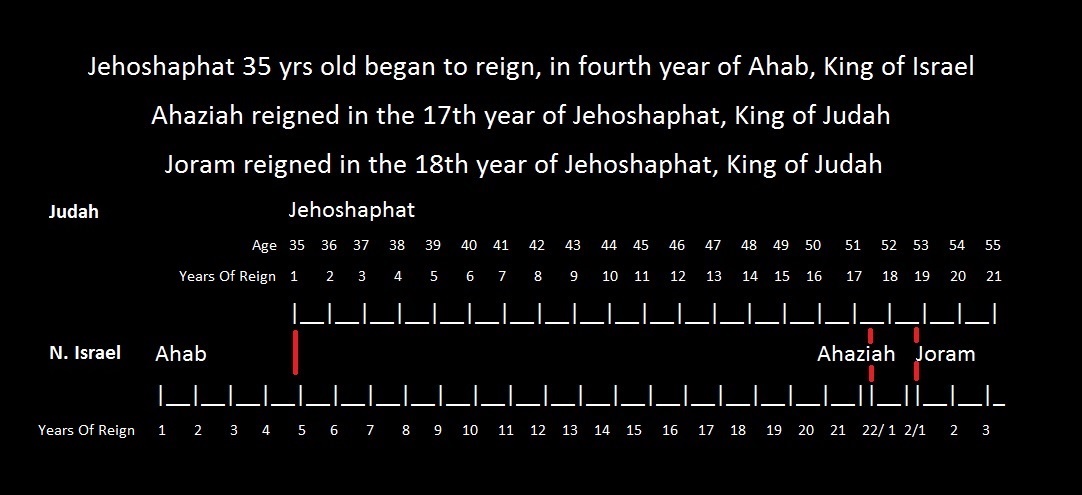
Continuing with the timeline in verse sixteen of the 1st King's passage, it says that Jehoram started reigning, in Judah, in the fifth year of Joram, King of Israel.
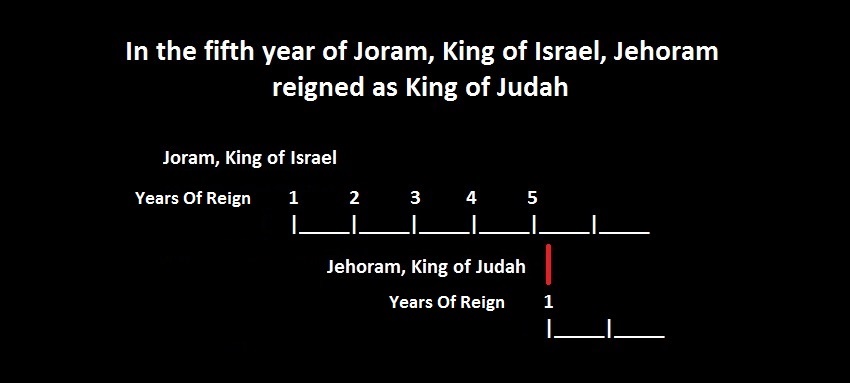
There is a problem with this, and it is noted in another location in the book of the Kings
1 Kings 22:42
1Ki 22:42 Jehoshaphat was thirty and five years old when he began to reign; and he reigned twenty and five years in Jerusalem....
This is a chart of the time line of their reigns
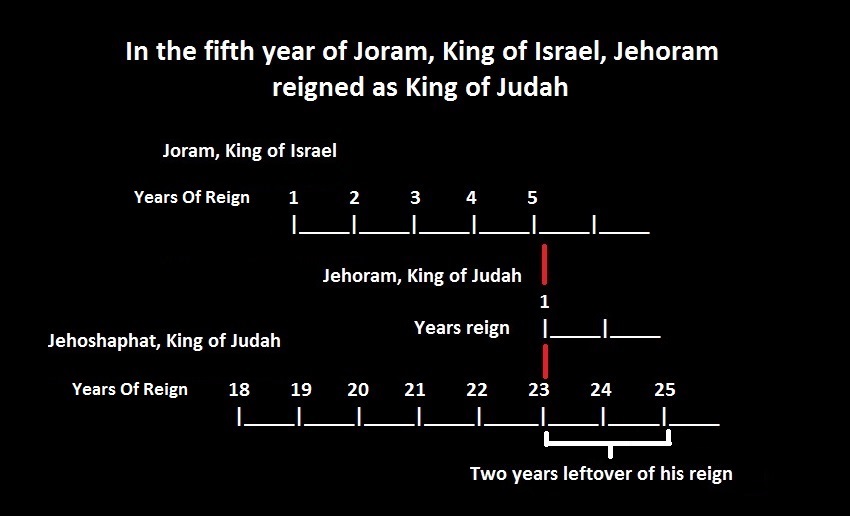
Based on this last 1st Kings passage, it reveals above that Joram of Israel started to reign in the eighteenth year of Jehosaphat's reign. If we go five years later, that would take it to Jehosaphat's twenty third year of his reign. That means Jehoram would have reigned his first year during his father, Jehosaphat's twenty third year of his reign. Now there is a conflict. Why did it say it this way? Did the Scribes give the wrong year, or is it possible that both Joram and Jehosaphat reigned together in that last two years of Jehosaphat's kingship?
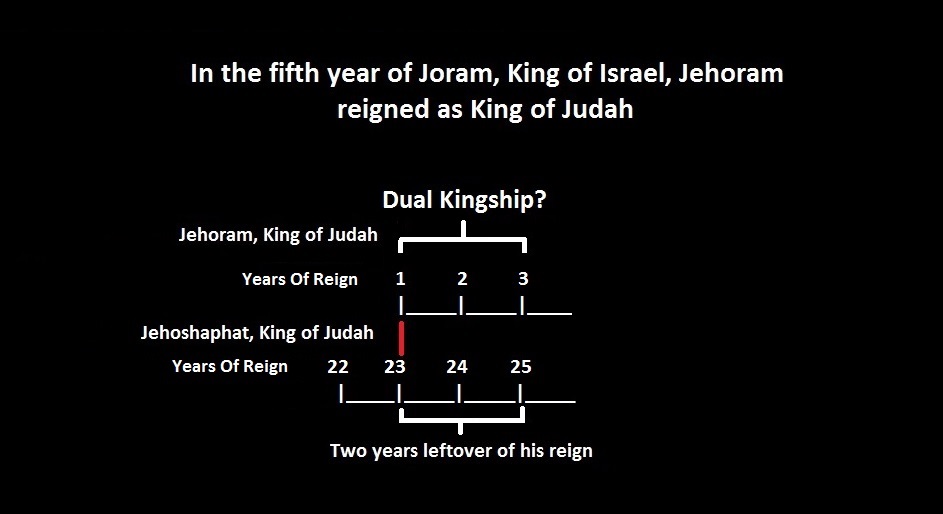
So the question is "Was it a co-regency"?
This is a chart of the kings in Israel, and according to this source, it shows in the red boxes the places where there were co-regencies:

Based on this chart, it is strongly probable that Jehoram and Jehoshaphat shared a co-regentship together.
THE RELATIONSHIPS BETWEEN THE KINGS OF JUDAH AND THE KINGS OF ISRAEL DURING THE TIME OF THE TWO JORAMS/JEHORAMS
These three generations have been the only time in history that the two kings in the divided kingdom period were ever closely involved:
THE RELATIONSHIP BETWEEN KING JEHOSHAPHAT OF JUDAH AND KING AHAB OF ISRAEL:
The relationship between King Jehoshaphat and King Ahab is noted in the books of the Kings and Chronicles
1 Kings 22:2-4
1Ki 22:2 And it came to pass in the third year, that Jehoshaphat, the King of Judah, came down to the king of Israel. 3 And the king of Israel said unto his servants, Know ye that Ramoth in Gilead is ours, and we be still, and take it not out of the hand of the king of Syria? 4 And he said unto Jehoshaphat, Wilt thou go with me to battle to Ramoth-Gilead? And Jehoshaphat said to the king of Israel, I am as thou art, my People as thy People, my horses as thy horses.
2 Chronicles 18:3
2Ch 18:3 And Ahab king of Israel said unto Jehoshaphat, King of Judah, Wilt thou go with me to Ramoth-Gilead? And he answered him, I am as thou art, and my People as thy People; and we will be with thee in the war.
Based on these accounts, the relationship between these two kings were close.
THE RELATIONSHIP BETWEEN KING JEHOSHAPHAT OF JUDAH AND KING AHAZIAH OF ISRAEL:
The relationship between King Jehoshaphat and King Ahaziah is noted in the books of the Kings and Chronicles
1 Kings 22:48-49
1Ki 22:48 Jehoshaphat made ships of Tharshish to go to Ophir for gold: but they went not; for the ships were broken at Ezion-Geber. 49 Then said Ahaziah, the son of Ahab, unto Jehoshaphat, Let my servants go with thy servants in the ships. But Jehoshaphat would not.
2 Chronicles 20:35-37
2Ch 20:35 And after this did Jehoshaphat, King of Judah, join himself with Ahaziah, King of Israel, who did very wickedly: 36 And he joined himself with him to make ships to go to Tarshish: and they made the ships in Ezion-Geber. 37 Then Eliezer, the son of Dodavah of Mareshah, prophesied against Jehoshaphat, saying, Because thou hast joined thyself with Ahaziah, hwhy hath broken ta-thy works. And the ships were broken, that they were not able to go to Tarshish.
These sources show that the relationship between these two kings were involved, but there is no mention how close they were.
THE RELATIONSHIP BETWEEN KING JEHOSHAPHAT OF JUDAH AND KING JORAM OF ISRAEL:
The relationship between King Jehoshaphat and King Joram is noted in the book of the Kings
2 Kings 3:6-7
2Ki 3:6 And king Jehoram went out of Samaria the same time, and numbered ta-all Israel. 7 And he went and sent to Jehoshaphat, the King of Judah, saying, The king of Moab hath rebelled against me: wilt thou go with me against Moab to battle? And he said, I will go up: I am as thou art, my People as thy People, and my horses as thy horses.
This shows that the relationship between these two kings were close.
THE RELATIONSHIP BETWEEN KING JORAM/JEHORAM OF JUDAH AND KING JORAM/JEHORAM OF ISRAEL:
There are no accounts of any correspondence of the two Jorams/Jehorams communicating between each other in the book of the Kings or in the book of the Chronicles.
THE RELATIONSHIP BETWEEN KING AHAZIAH OF JUDAH AND KING JORAM OF ISRAEL:
The relationship between King Ahaziah and King Joram is noted in the books of the Kings and Chronicles
2 Kings 8:26-28
2Ki 8:26 Two and twenty years old was Ahaziah when he began to reign; and he reigned one year in Jerusalem....27 And he walked in the way of the house of Ahab, and did evil in the sight of hwhy, as did the house of Ahab:...28 And he went with ta-Joram, the son of Ahab, to the war against Hazael, King of Syria, in Ramoth-Gilead;...
2 Chronicles 22:4-6
2Ch 22:4 Wherefore he did evil in the sight of hwhy like the house of Ahab: for they were his counsellors after the death of his father to his destruction. 5 He walked also after their counsel, and went with ta-Jehoram, the son of Ahab, King of Israel, to war against Hazael, King of Syria, at Ramoth-Gilead: and the Syrians smote ta-Joram. 6 And he returned to be healed in Jezreel because of the wounds which were given him at Ramah, when he fought with ta-Hazael, King of Syria. And Azariah, the son of Jehoram, King of Judah, went down to see ta-Jehoram, the son of Ahab, at Jezreel, because he was sick.
These sources reveal that the relationship between these two kings were close.
There is nowhere else in the history of the kings in Israel that two kings worked together like the kings of this contemporary period.
These next charts reveal the genealogies of the two kings that we know up to date:
The kings of Northern Israel
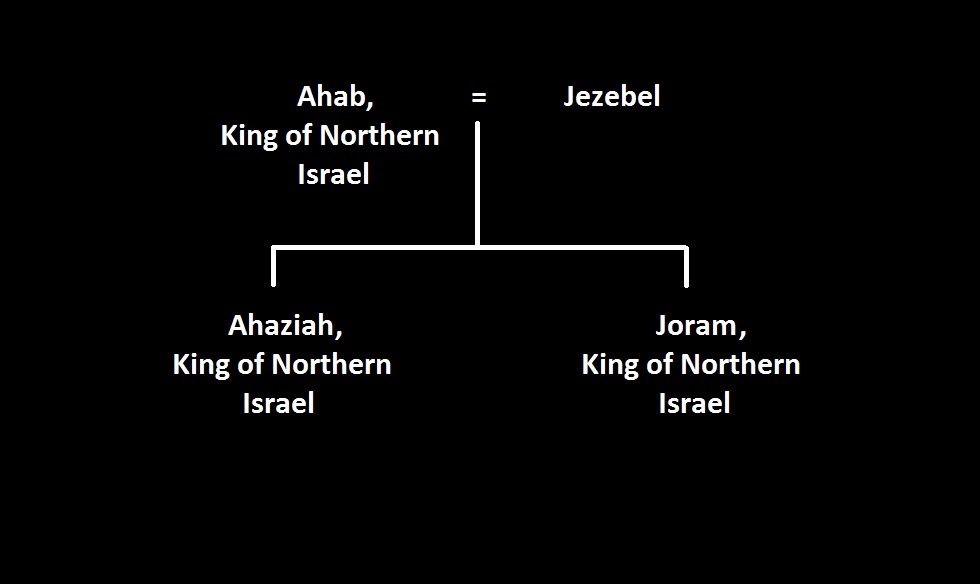
The kings of Judah
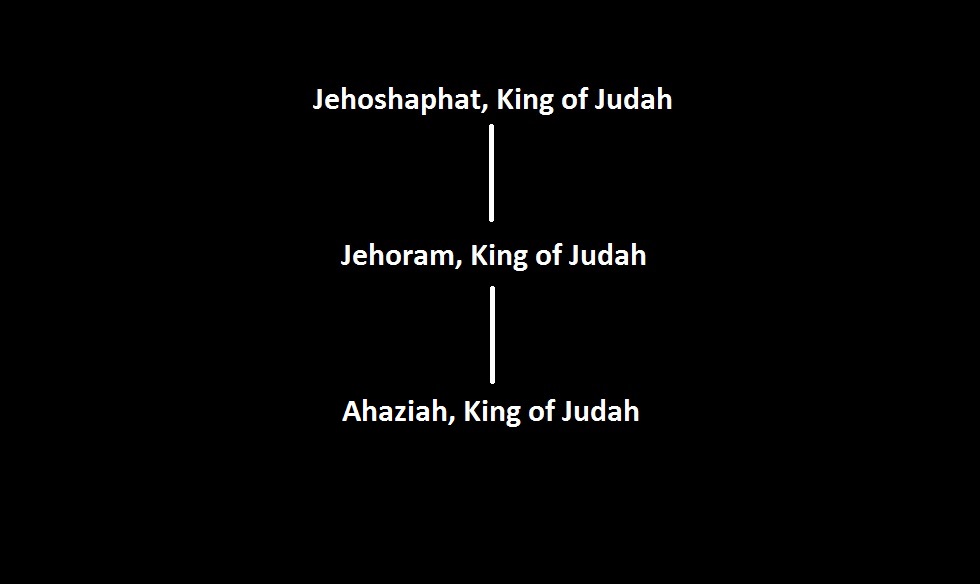
Continuing.
DEATH ACCOUNTS OF THE TWO JORAMS/JEHORAMS
These are descriptions of the different accounts of the deaths between the two kings:
JEHORAM, KING OF JUDAH
The death of King Jehoram is noted in the books of the Kings and Chronicles
2 Kings 8:24
2Ki 8:24 And Joram slept with his fathers, and was buried with his fathers in the city of David: and Ahaziah, his, son reigned in his stead.
2 Chronicles 21:14-19
2Ch 21:14 Behold, with a great plague will hwhy smite thy People, and thy children, and thy wives, and all thy goods: 15 And thou shalt have great sickness by disease of thy bowels, until thy bowels fall out by reason of the sickness day by day. 16 Moreover hwhy stirred up against Jehoram ta-the spirit of the Philistines, and of the Arabians, that were near the Ethiopians: 17 And they came up into Judah, and brake into it, and carried away ta-all the substance that was found in the king's house, and his sons also, and his wives; so that there was never a son left him, save Jehoahaz, the youngest of his sons. 18 And after all this hwhy smote him in his bowels with an incurable disease. 19 And it came to pass, that in process of time, after the end of two years, his bowels fell out by reason of his sickness: so he died of sore diseases. And his People made no burning for him, like the burning of his fathers.
JORAM, KING OF NORTHERN ISRAEL
The death of King Joram is noted in the books of the Kings and Chronicles
2 Kings 8:28-29, 9:14-26
2Ki 8:28 And he went with ta-Joram, the son of Ahab, to the war against Hazael, King of Syria in Ramoth-Gilead; and the Syrians wounded ta-Joram. 29 And king Joram went back to be healed in Jezreel of the wounds which the Syrians had given him at Ramah, when he fought against ta-Hazael, King of Syria. And Ahaziah, the son of Jehoram, King of Judah, went down to see ta-Joram, the son of Ahab, in Jezreel, because he was sick....
2Ki 9:14 So Jehu, the son of Jehoshaphat, the son of Nimshi, conspired against Joram. (Now Joram had kept Ramoth-Gilead, he and all Israel, because of Hazael, King of Syria. 15 But king Joram was returned to be healed in Jezreel of the wounds which the Syrians had given him, when he fought with ta-Hazael, King of Syria.) And Jehu said, If it be your minds, then let none go forth nor escape out of the city to go to tell it in Jezreel. 16 So Jehu rode in a chariot, and went to Jezreel; for Joram lay there. And Ahaziah, King of Judah, was come down to see ta-Joram. 17 And there stood a watchman on the tower in Jezreel, and he spied ta-the company of Jehu as he came, and said, I see a company. And Joram said, Take an horseman, and send to meet them, and let him say, Is it peace? 18 So there went one on horseback to meet him, and said, Thus saith the king, Is it peace? And Jehu said, What hast thou to do with peace? Turn thee behind me. And the watchman told, saying, The messenger came to them, but he cometh not again. 19 Then he sent out a second on horseback, which came to them, and said, Thus saith the king, Is it peace? And Jehu answered, What hast thou to do with peace? Turn thee behind me. 20 And the watchman told, saying, He came even unto them, and cometh not again: and the driving is like the driving of Jehu, the son of Nimshi; for he driveth furiously. 21 And Joram said, Make ready. And his chariot was made ready. And Joram, King of Israel, and Ahaziah, King of Judah, went out, each in his chariot, and they went out against Jehu, and met him in the portion of Naboth the Jezreelite. 22 And it came to pass, when Joram saw ta-Jehu, that he said, Is it peace, Jehu? And he answered, What peace, so long as the whoredoms of thy mother, Jezebel, and her witchcrafts are so many? 23 And Joram turned his hands, and fled, and said to Ahaziah, There is treachery, O Ahaziah. 24 And Jehu drew a bow with his full strength, and smote ta-Jehoram between his arms, and the arrow went out at his heart, and he sunk down in his chariot. 25 Then said Jehu to Bidkar, his captain, Take up, and cast him in the portion of the field of Naboth, the Jezreelite: for remember how that, when I and thou ta rode together after Ahab, his father, hwhy laid ta-this burden upon him; 26 Surely I have seen yesterday ta-the blood of Naboth, and the blood of his sons, saith hwhy; and I will requite thee in this plat, saith hwhy. Now therefore take and cast him into the plat of ground, according to the Word of hwhy.
2 Chronicles 22:5-7
2 Ch 22:5 He [Ahaziah] walked also after their counsel, and went with ta-Jehoram, the son of Ahab, King of Israel, to war against Hazael, King of Syria, at Ramoth-Gilead: and the Syrians smote ta-Joram. 6 And he returned to be healed in Jezreel because of the wounds which were given him at Ramah, when he fought with ta-Hazael, King of Syria. And Azariah, the son of Jehoram, King of Judah, went down to see ta-Jehoram, the son of Ahab, at Jezreel, because he was sick. 7 And the destruction of Ahaziah was of Elohim by coming to Joram: for when he was come, he went out with Jehoram against Jehu, the son of Nimshi, whom hwhy had anointed to cut off ta-the house of Ahab.
Notice that account of the King of Judah's event to his death in both of these books were minimal. It did not specify where his death happened. We will next compare King Jehoram of Judah's death to King Asa's record of his death which is noted in the book of the Chronicles
2 Chronicles 16:12-14
12 And Asa in the thirty and ninth year of his reign was diseased in his feet, until his disease was exceeding great: yet in his disease he sought not to ta-hwhy, but to the physicians. 13 And Asa slept with his fathers, and died in the one and fortieth year of his reign. 14 And they buried him in his own sepulchres, which he had made for himself in the City of David, and laid him in the bed which was filled with sweet odours and divers kinds of spices prepared by the apothecaries' art: and they made a very great burning for him.
This chronicle details that he was diseased like king Jehoram, and specifies where he was buried, and the People made a ritual burning memorial for him. And now we know that is why it was noted earlier in 2 Chronicles 21:19 that King Jehoram was not given a ritual bonfire. Because it was first done with king Asa.
THE ISSUE REGARDING BOTH JORAM'S AND JEHORAM'S DEATHS
The Joram and Jehoram kings had different accounts of their deaths within a year of each other, but I have a strong theory that they could have died at the same day and the same hour. The account of King Jehoram of Judah's death only generalized his death by having his guts fall out from a plague. Joram, King of Northern Israel died by a battle, and Ahaziah, King of Judah, died that same day as well. There has to be a reason for this. In my humble but strong opinion, there must have been something going on behind the scenes in the scribes' room when they wrote Jehoram's death. Though I cannot prove it, this is not the only account where scribes wrote differently about the same event, which I will reveal shortly.
The chart below shows the two kings were within the same year of Ahaziah's reign
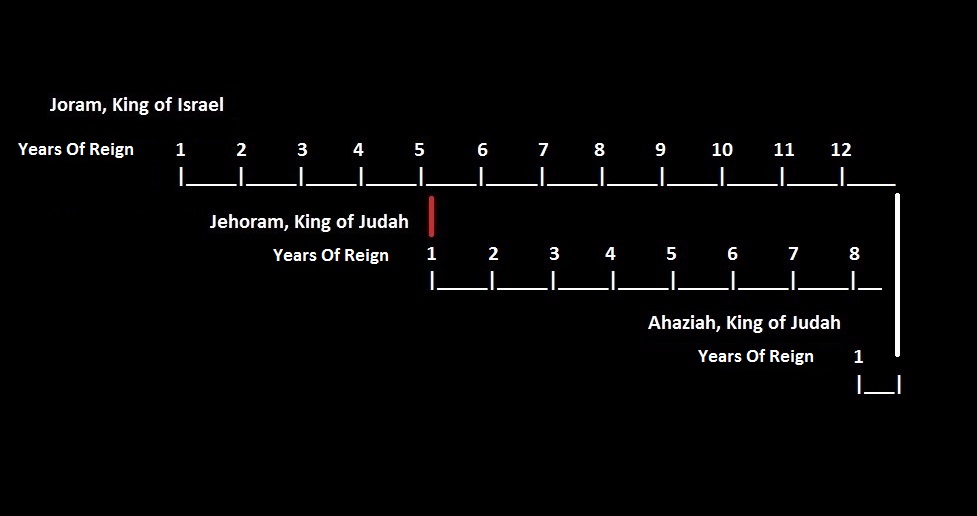
Question: Is it possible that King Jehoram of Judah allowed Ahaziah to take over the throne of Judah while he was still alive and made the scribes make up an account of his death to cover up the real story? Based on the co-regent chart, it did happen.
There have been writings of the same account that differed slightly from each other. One example was two different accounts of David taking a census of the People, and they are noted in the book of the prophet Samuel and in the book of the Chronicles
THE FIRST ACCOUNT:
2 Samuel 24:1-25
2Sa 24:1 And again the Anger of hwhy was kindled against Israel, and he moved ta-David against them to say, Go, number ta-Israel and ta-Judah. 2 For the king said to Joab, the Captain of the Host, which was with him, Go now through all the tribes of Israel, from Dan even to Beersheba, and number ye ta-the People, that I may know ta the number of the People. 3 And Joab said unto the king, Now hwhy, thy Elohim, add unto the People, how many soever they be, an hundredfold, and that the eyes of my lord, the king, may see it: but why doth my lord the king delight in this thing? 4 Notwithstanding the king's word prevailed against Joab, and against the Captains of the Host. And Joab and the Captains of the Host went out from the presence of the king, to number ta-the People of ta-Israel. 5 And they passed over ta-Jordan, and pitched in Aroer, on the right side of the city that lieth in the midst of the river of Gad, and toward Jazer: 6 Then they came to Gilead, and to the land of Tahtim-Hodshi; and they came to Danjaan, and about to Zidon, 7 And came to the strong hold of Tyre, and to all the cities of the Hivites, and of the Canaanites: and they went out to the south of Judah, even to Beersheba. 8 So when they had gone through all the land, they came to Jerusalem at the end of nine months and twenty days. 9 And Joab gave up the sum of ta-the number of the People unto the king: and there were in Israel eight hundred thousand valiant men that drew the sword; and the men of Judah were five hundred thousand men. 10 And David's heart smote him after that he had numbered ta-the People. And David said unto hwhy, I have sinned greatly in that I have done: and now, I beseech thee, hwhy, take away ta-the iniquity of Thy servant; for I have done very foolishly. 11 For when David was up in the morning, the Word of hwhy came unto the prophet Gad, David's seer, saying, 12 Go and say unto David, Thus saith hwhy, I offer thee three things; choose thee one of them, that I may do it unto thee. 13 So Gad came to David, and told him, and said unto him, Shall seven years of famine come unto thee in thy land? Or wilt thou flee three months before thine enemies, while they pursue thee? Or that there be three days' pestilence in thy land? Now advise, and see what answer I shall return to him that sent me. 14 And David said unto Gad, I am in a great strait: let us fall now into the Hand of hwhy; for His mercies are great: and let me not fall into the hand of man. 15 So hwhy sent a pestilence upon Israel from the morning even to the time appointed: and there died of the People from Dan even to Beersheba seventy thousand men. 16 And when the angel stretched out his hand upon Jerusalem to destroy it, hwhy repented him of the evil, and said to the angel that destroyed the People, It is enough: stay now thine hand. And the angel of hwhy was by the threshingplace of Araunah, the Jebusite. 17 And David spake unto hwhy when he saw ta-the angel that smote the People, and said, Lo, I have sinned, and I have done wickedly: but these sheep, what have they done? let thine hand, I pray thee, be against me, and against my father's house. 18 And Gad came that day to David, and said unto him, Go up, rear an altar unto hwhy in the threshingfloor of Araunah, the Jebusite. 19 And David, according to the saying of Gad, went up as hwhy commanded. 20 And Araunah looked, and saw ta-the king and ta-his servants coming on toward him: and Araunah went out, and bowed himself before the king on his face upon the ground. 21 And Araunah said, Wherefore is my lord, the king, come to his servant? And David said, To buy ta-the threshingfloor of thee, to build an altar unto hwhy, that the plague may be stayed from the People. 22 And Araunah said unto David, Let my lord, the king, take and offer up what seemeth good unto him: behold, here be oxen for burnt sacrifice, and threshing instruments and other instruments of the oxen for wood. 23 All these things did Araunah, as a king, give unto the king. And Araunah said unto the king, hwhy thy Elohim accept thee. 24 And the king said unto Araunah, Nay; but I will surely buy it of thee at a price: neither will I elevate Elevation Offerings unto hwhy, my Elohim, of that which doth cost me nothing. So David bought ta-the threshingfloor and the oxen for fifty shekels of silver. 25 And David built there an altar unto hwhy, and offered Elevation Offerings and Peace Offerings. So hwhy was intreated for the land, and the plague was stayed from Israel.
THE SECOND ACCOUNT:
1 Chronicles 21:1-25
1Ch 21:1 And Satan stood up against Israel, and provoked ta-David to number ta-Israel. 2 And David said to Joab and to the Rulers of the People, Go, number ta-Israel from Beersheba even to Dan; and bring ta-the number of them to me, that I may know it. 3 And Joab answered, hwhy make his People an hundred times so many more as they be: but, my lord, the king, are they not all my lord's servants? Why then doth my lord require this thing? Why will he be a cause of trespass to Israel? 4 Nevertheless the king's word prevailed against Joab. Wherefore Joab departed, and went throughout all Israel, and came to Jerusalem. 5 And Joab gave the sum of ta-the number of the People unto David. And all they of Israel were a thousand thousand and an hundred thousand men that drew sword: and Judah was four hundred threescore and ten thousand men that drew sword. 6 But Levi and Benjamin counted he not among them: for the king's word was abominable to ta-Joab. 7 And Elohim was displeased with this thing; therefore he smote ta-Israel. 8 And David said unto Elohim, I have sinned greatly, because I have done ta-this thing: but now, I beseech thee, do away ta-the iniquity of thy servant; for I have done very foolishly. 9 And hwhy spake unto Gad, David's seer, saying, 10 Go and tell David, saying, Thus saith hwhy, I offer thee three things: choose thee one of them, that I may do it unto thee. 11 So Gad came to David, and said unto him, Thus saith hwhy, Choose thee 12 Either three years' famine; or three months to be destroyed before thy foes, while that the sword of thine enemies overtaketh thee; or else three days the Sword of hwhy, even the pestilence, in the land, and the Messenger of hwhy destroying throughout all the coasts of Israel. Now therefore advise thyself what ta-word I shall bring again to Him that sent me. 13 And David said unto Gad, I am in a great strait: let me fall now into the Hand of hwhy; for very great are his mercies: but let me not fall into the hand of man. 14 So hwhy sent pestilence upon Israel: and there fell of Israel seventy thousand men. 15 And Elohim sent an angel unto Jerusalem to destroy it: and as he was destroying, hwhy beheld, and he repented him of the evil, and said to the Messenger that destroyed, It is enough, stay now thine hand. And the Messenger of hwhy stood by the threshingfloor of Ornan, the Jebusite. 16 And David lifted up ta-his eyes, and saw ta-the Messenger of hwhy stand between the earth and the heaven, having a drawn sword in his hand stretched out over Jerusalem. Then David and the Elders of Israel, who were clothed in sackcloth, fell upon their faces. 17 And David said unto Elohim, Is it not I that commanded the People to be numbered? even I it is that have sinned and done evil indeed; but as for these sheep, what have they done? let thine hand, I pray thee, hwhy, my Elohim, be on me, and on my father's house; but not on Thy People, that they should be plagued. 18 Then the Messenger of hwhy commanded Gad to say to David, that David should go up, and set up an altar unto hwhy in the threshingfloor of Ornan, the Jebusite. 19 And David went up at the saying of Gad, which he spake in the Name of hwhy. 20 And Ornan turned back, and saw ta-the Messenger; and his four sons with him hid themselves. Now Ornan was threshing wheat. 21 And as David came to Ornan, Ornan looked and saw ta-David, and went out of the threshingfloor, and bowed himself to David with his face to the ground. 22 Then David said to Ornan, Grant me the place of this threshingfloor, that I may build an altar therein unto hwhy: thou shalt grant it me for the full price: that the plague may be stayed from the People. 23 And Ornan said unto David, Take it to thee, and let my lord, the king, do that which is good in his eyes: lo, I give thee the oxen also for Elevation Offerings, and the threshing instruments for wood, and the wheat for the Food (Grain) Offering; I give it all. 24 And king David said to Ornan, Nay; but I will verily buy it for the full price: for I will not take that which is thine for hwhy, nor elevated Elevation Offerings without cost. 25 So David gave to Ornan for the place six hundred shekels of gold by weight. 26 And David built there an altar unto hwhy, and elevated Elevation Offerings and Peace Offerings, and called upon hwhy; and he answered him from heaven by fire upon the altar of the Elevation Offering. 27 And hwhy commanded the Messenger; and he put up his sword again into the sheath thereof. 28 At that time when David saw that hwhy had answered him in the threshingfloor of Ornan, the Jebusite, then he sacrificed there. 29 For the Tabernacle of hwhy, which Moses made in the wilderness, and the Altar of the Elevation Offering, were at that season in the high place at Gibeon. 30 But David could not go before it to enquire of Elohim: for he was afraid because of the sword of the Messenger of hwhy.
There are those who say that one of the events was the threshing floor at the Mount of Olives while the other was the threshing floor at the Temple Mount. I do not see that at all. I have no doubt that these two threshing floors were the same location at the Temple Mount. The difference is the amounts of the two purchases. One of them was 600 shekels in gold, and the other was 50 shekels in silver. One can see that these two accounts the scribes wrote were different amounts, but hwhy allowed it for whatever reason.
There are discrepancies between the amounts in these two accounts of the purchase of the threshing floor. It possible that these two accounts were written by two different scribes? I don't have an answer to that.
In conclusion of this segment, based on these circumstances, it is possible that there were different scribes writing accounts of the kings that could have written discrepancies.
THE TIME OF THE DEATHS OF THE TWO JORAM/JEHORAMS
Another issue is that many charts of the kings of Israel and Judah show that these two kings died within a year of each other.
This is what it says of the years of the reigns of each of the kings, both noted in the book of the Kings:
JORAM, KING OF ISRAEL
2 Kings 3:1
2Ki 3:1 Now Jehoram, the son of Ahab, began to reign over Israel in Samaria the eighteenth year of Jehoshaphat, King of Judah, and reigned twelve years.
JEHORAM, KING OF JUDAH
2 Kings 8:16-17
2Ki 8:16 And in the fifth year of Joram, the son of Ahab, King of Israel, Jehoshaphat, being then King of Judah, Jehoram, the son of Jehoshaphat, King of Judah began to reign. 17 Thirty and two years old was he when he began to reign; and he reigned eight years in Jerusalem.
This is a chart revealing the timeline of reigns of the two kings
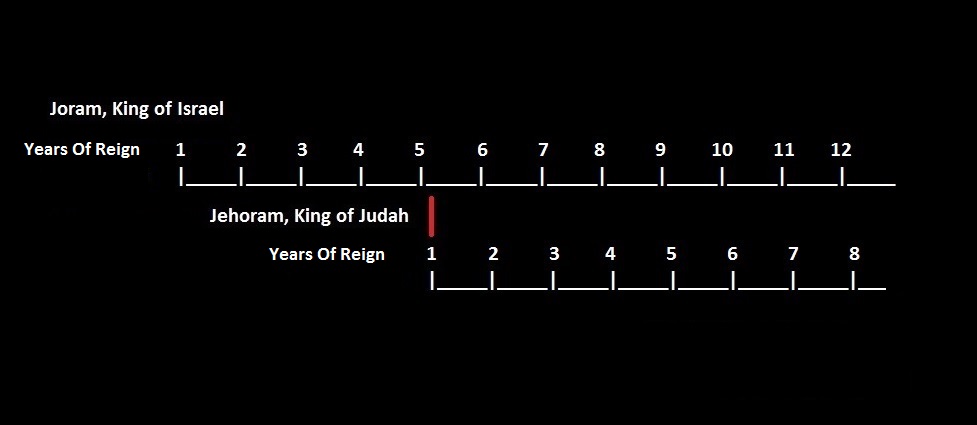
Notice that the two kings are within a year of each other.
In this chart below, Ahaziah's reign is added

In either chart, King Jehoram of Judah supposedly died in the year of King Joram of Israel's last year of his reign. Just because it says in that year the king started to reign, it doesn't mean that every king began sitting on their thrones on the first day of the first month of the year- like January 1st on our Gregorian calendars.
JEHORAM'S RELATIONSHIP WITH THE HOUSE OF ISRAEL
Looking at the beginning of Jehoram's reign in Judah again:
2 Kings 8:16
2Ki 8:16 And in the fifth year of Joram, the son of Ahab, King of Israel, Jehoshaphat, being then King of Judah, Jehoram, the son of Jehoshaphat, King of Judah, began to reign.
In verse sixteen it says that "...Jehoshaphat, 'being then' King of Judah...". Why did the King James translators translated it this way?
I searched the other kings that came to reign in Israel and Judah and no where else does it mention anything like this phrase. I researched the Hebrew text, and the words "being then" is not in the Hebrew. Also, the first Jehoshaphat translation, in the Hebrew text, it reveals that the text says "vee-hoh-shah-phaht", which literally is translated "and Jehoshaphat". This was ignored by the translators.
Looking at the whole verse in the Hebrew text:

This
is the literal interpretation:
"And
in year five of
Yoram, son of
Akhav, King of
Yisrael, and Y'hoshaphat, King of
Y'hudah, reigned Y'horam,
son
of Y'hoshaphat,
King of
Y'hudah."
This was an eye opener! Yoram, King of Israel, was son of Ahab "AND" son of Jehoshaphat. Why did the translators distort their translation? I don't have an answer to that. It is probable that they didn't understand the text.
These are some other translation versions of this verse:
(JPS) And in the fifth year of Joram the son of Ahab king of Israel, Jehoshaphat being the king of Judah, Jehoram the son of Jehoshaphat king of Judah began to reign.
(Brenton)
In the fifth year
of
Joram son of Achaab king of Israel, and while Josaphat was king of
Juda, Joram the son of Josaphat king of Juda began to reign.
(Bishops) The fyft yere of Ioram the sonne of Ahab king of
Israel,
Iehosaphat being also king of Iuda, Ioram the sonne of Iehosaphat king
of Iuda began to raigne.
(Geneva) Now in the fift yere of Ioram ye sonne of Ahab King
of
Israel, and of Iehoshaphat King of Iudah, Iehoram the sonne of
Iehoshaphat King of Iudah began to reigne.
(KJV-1611) And in the fifth yeere of Ioram the sonne of Ahab
king
of
Israel, Iehoshaphat being then king of Iudah, Iehoram the sonne of
Iehoshaphat king of Iudah began to reigne.
(ESV) In
the fifth year of
Joram the son of Ahab, king of
Israel,
when
Jehoshaphat was king of Judah, Jehoram the son of Jehoshaphat, king of
Judah, began to reign.
(KJV)
And in the fifth year
of Joram the son of Ahab king of
Israel,
Jehoshaphat being then king of Judah, Jehoram the son of Jehoshaphat
king of Judah began to reign.
(KJV-BRG)
And in the fifth
year of
Joram the son of Ahab king of Israel, Jehoshaphat being then king of
Judah, Jehoram the son of Jehoshaphat king of Judah began to reign.
(MKJV) And in the fifth year of Jehoram the son of Ahab king
of
Israel, Jehoshaphat being then king of Judah, Jehoram the son of
Jehoshaphat king of Judah began to reign.
(KJVA) And in the fifth year of Joram the son of Ahab king of
Israel,
Jehoshaphat being then king of Judah, Jehoram the son of Jehoshaphat
king of Judah began to reign.
(WoY) And in the fifth year of Joram the son of Ahab king of
Israel,
Jehoshaphat being then king of Judah, Jehoram the son of Jehoshaphat
king of Judah began to reign.
(The Scriptures 1998+) And in the fifth year of Yehoram son
of
Aḥaḇ
sovereign of Yisra’ĕl – Yehoshaphat was sovereign
of
Yehuḏah – Yehoram
son of Yehoshaphat began to reign as sovereign of Yehuḏah.
(NET) Jehoram's Reign over
Judah In
the fifth year of the reign of
Israel's King Joram, son of Ahab, Jehoshaphat's son Jehoram became king
over Judah.
(ASV) And in the fifth year of Joram the son of Ahab king of
Israel,
Jehoshaphat being then king of Judah, Jehoram the son of Jehoshaphat
king of Judah began to reign.
(YLT) And in the fifth year of Joram son of Ahab king of
Israel--and
Jehoshaphat is king of Judah--hath Jehoram son of Jehoshaphat king of
Judah reigned;
(LBP) And in the fifth year of Joram the son of Ahab king of
Israel.
Joram the son of Jehoshaphat, king of Judah, began to reign.
(Vulgate) anno
quinto Ioram
filii Ahab regis Israhel et
Iosaphat
regis Iuda regnavit Ioram filius Iosaphat rex Iuda
(Webster) And in the fifth year of Joram the son of Ahab king of Israel, Jehoshaphat being then king of Judah, Jehoram the son of Jehoshaphat king of Judah began to reign.
Notice that all of these versions above removed the prefix "and" next to the first Jehoshaphat, that is originally in the Hebrew text, and added words that relate to first Jehoshaphat that are not in the Hebrew text.
The interpreters of these versions clearly misinterpreted this verse, because either they did not understand what this verse was saying, or they knew what it was saying but distorted the verse and hid the truth from us by removing and adding words to fit in their interpretation which goes against Moses statement in the book of Deuteronom
Deuteronomy 4:2
Deu 4:2 You shall not add upon the
Word which I command
you, and you shall not remove from him, to keep ta-the Commandments
of hwhy, your Elohim,
which I command
you.
Looking again at Joram, King of Israel. It says in its proper text that he was a son to both king Ahab and king Jehoshaphat. I did not see anything anywhere else in the Tanakh how he became a son to both fathers.
KING JORAM'S RELATION TO BOTH FAMILIES
This is the account of the beginning of Joram's reign which is noted in the book of the Kings
2
Kings 8:17-19
2Ki 8:17 Thirty and two years old was he when he began to reign; and he reigned eight years in Jerusalem. 18 And he walked in the way of the kings of Israel, as did the house of Ahab: for the daughter of Ahab was his wife: and he did evil in the sight of hwhy. 19 Yet hwhy would not destroy ta-Judah for David his servant's sake, as he promised him to give him alway a light, and to his children.
In verse eighteen, it shows that Jehoram, King of Judah, married a daughter of Ahab and Jezebel.
This is a chart that shows the marriage connection between king Jehoram and King Ahab
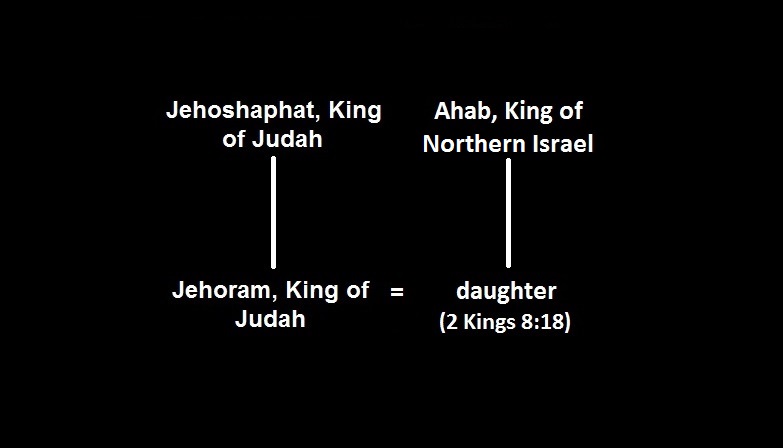
Question: "Is there a record who the daughter of Ahab was"? The answer is yes. It comes from the account of the beginning of Azahiah's reign which is noted in the book of the Kings
THE RELATIONSHIP BETWEEN KING AHAZIAH OF JUDAH AND KING JORAM OF ISRAEL:
2 Kings 8:26-28
2Ki 8:26 Two and twenty years old was Ahaziah when he began to reign; and he reigned one year in Jerusalem. And his mother's name was Athaliah, the daughter of Omri, King of Israel. 27 And he walked in the way of the house of Ahab, and did evil in the sight of hwhy, as did the house of Ahab: for he was the son in law of the house of Ahab. 28 And he went with ta-Joram, the son of Ahab, to the war against Hazael, King of Syria in Ramoth-Gilead;...
Ahaziah was the son of Jehoram, King of Judah. It says that his mother, Athaliah was the daughter of Omri, but in this case, it is actually saying that she is a daughter of the house of Omri. If we took it literally, it would have made Athaliah a sister to Ahab, and she would have been too old to bear children. The only answer would be that she would have been the grandfather of Omri, and daughter to Ahab and Jezebel.
Going back to the relationships between the other kings, How often in the history of the kings in Israel did two kings work together as much as these dynasties? The only reason these kings were involved together is the result of the marriage of King Jehoram of Judah marrying Athaliah, Ahab and Jezebel's daughter.
This is a chart which shows the marriage connection between Jehoram and Athaliah:
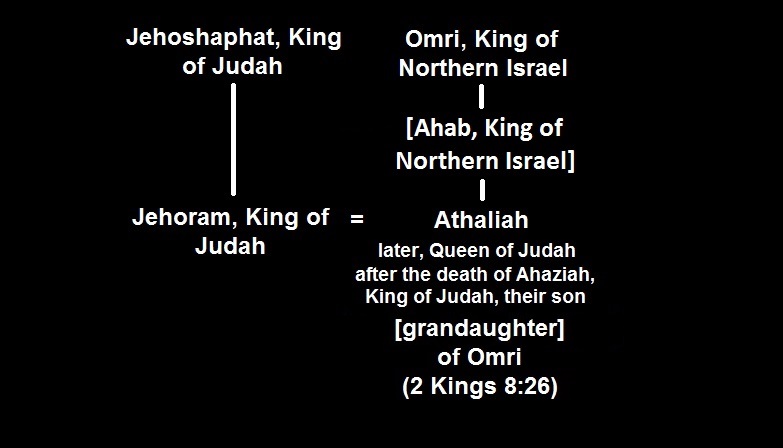
Indirectly related, another son-in-law that married into a kingdom via marriage was King David which is noted in the book of the prophet Samuel
1 Samuel 18:17-27
1Sa 18:17 And Saul said to David, Behold my elder daughter, Merab, her will I give thee to wife: only be thou valiant for me, and fight the hwhy's battles. For Saul said, Let not mine hand be upon him, but let the hand of the Philistines be upon him. 18 And David said unto Saul, Who am I? And what is my life, or my father's family in Israel, that I should be son-in-law to the king? 19 But it came to pass at the time when ta-Merab, Saul's daughter, should have been given to David, that she was given unto Adriel, the Meholathite, to wife. 20 And Michal, Saul's daughter, loved ta-David: and they told Saul, and the thing pleased him. 21 And Saul said, I will give him her, that she may be a snare to him, and that the hand of the Philistines may be against him. Wherefore Saul said to David, Thou shalt this day be my son-in-law in the one of the twain. 22 And Saul commanded ta-his servants, saying, Commune with David secretly, and say, Behold, the king hath delight in thee, and all his servants love thee: now therefore be the king's son-in-law. 23 And Saul's servants spake ta-those words in the ears of David. And David said, Seemeth it to you a light thing to be a king's son-in-law, seeing that I am a poor man, and lightly esteemed? 24 And the servants of Saul told him, saying, On this manner spake David. 25 And Saul said, Thus shall ye say to David, The king desireth not any dowry, but an hundred foreskins of the Philistines, to be avenged of the king's enemies. But Saul thought to make ta-David fall by the hand of the Philistines. 26 And when his servants told David ta-these words, it pleased David well to be the king's son-in-law: and the days were not expired. 27 Wherefore David arose and went, he and his men, and slew of the Philistines two hundred men; and David brought ta-their foreskins, and they gave them in full tale to the king, that he might be the king's son-in-law. And Saul gave him ta-Michal, his daughter, to wife.
When David married Michal, Saul's daughter, from a promise if he returned 100 Philistine foreskins to Saul, which he returned 200, by right, David became an heir apparent to the kingdom.
It is now concluded that Jehoram, King of Judah, married into the house of Ahab by his marriage to Athaliah. When Ahaziah was born, he became a descendant of both houses of Ahab of the Kingdom of Northern Israel and Jehoshaphat of the Kingdom of Judah. Ahaziah, son of Jehoram, King of Judah, was named after Ahaziah, son of Ahab and Jezebel. That means that all of Ahaziah's descendants were of both houses of Judah and Northern Israel, including Joseph, the adopted father to Yeshua.
Not to sidetrack, but in the Gospel of Matthew, Yeshua was a descendant of King Jehoram and Ahaziah, who is from both houses of the Northern Kingdom of Israel and of the Southern Kingdom of Judah. Remember when during Passover, before Yeshua was crucified, Pilate sent Him to Herod, who was in Jerusalem at the time, because Yeshua was a Galilean, and Herod ruled in the region of Galilee at the time, which the region of Galilee was formerly the Northern House of Israel. Remember when Herod had a robe placed on Yeshua before he sent Him back to Pilate? Guess what? Herod relinquished and nullified his rule over the Northern House of the ten tribes, and passed it to Yeshua through that robe. This was Herod's equivalent act to Caiaiphus, the High Priest, renting his garment, nullifying his High Priesthood and passing the mantle to Yeshua. Also, when Yeshua was returned back to Pilate, He was handed over to the Roman soldiers and was mocked, beaten, and was given a crown of thorns on His head, a robe and a stick as a scepter. What did the soldiers say to Him in a mocking way? "All hail, King of the Jews". Though they mocked Him with those words, they represented the Roman Empire, and when the empire gave Him the title, the robe and the crown, though it was of thorns, nevertheless it was a crown, they gave the Kingship of the Southern House of Judah back to Yeshua. His title was confirmed by Pilate, that He was The King of the Jews, a.k.a. the King of Judah, by nailing Yeshua's title to the cross. So Yeshua reclaimed the kingship from both of the ancient divided houses of Israel.
The only way one can be a son to both fathers is if one is married to a daughter of the other father. There is no account how Joram, King of Northern Israel, became a son to both kings, but there are accounts that Jehoram, King of Judah, became a son to both Ahab and Jehoshaphat by his marriage to Ahab's daughter, Athaliah.
So back to the question of Joram, King of Israel. Based on the information, the only reason that Joram could be a son to both fathers could mean only one thing, but first, let's summarize what is mentioned in the teaching:
SUMMARY
*The two accounts of the death of each of the kings do differ, but the king of Judah's death has come into question if it was doctored up by the scribes.
*The relationships between the kings of Judah and the kings of Northern Israel from Jehoshaphat, and Ahab to Joram and Ahaziah were very close relationships, with the exception that there were no accounts of the relationship between the two Jorams/Jehorams.
*The two Jorams/Jehorams died within the same year, and it is possible that they died the same day and hour.
*Jehoram, King of Judah, married Athaliah, daughter of Ahab, King of Northern Israel, but no accounts of any marriage of Joram, King of Northern Israel.
*The kings of Judah after Jehoram, King of Judah, were from both houses of Israel, including Joseph, adopted father of Yeshua, by Jehoram's marriage to Athaliah, daughter of Ahab and Jezebel.
*Yeshua, being adopted by Joseph, became the descendant of both houses of Israel and claimed back the kingships by receiving the robes from representatives of both houses.
In spite of some differences and conflicts in events to these two, this is "THE QUESTION":
Is it possible that Joram/Jehoram, King of Northern Israel and Joram/Jehoram, King of Judah, are the same person?
The answer, in spite of some differences and some contrasting accounts, the issues show me that the answer is...
|
|
|
|
|
|
|
|
|
|
|
|
|
|
|
\/
YES!!!
Now that this mystery is solved, it can be concluded that Joram/Jehoram, son of Jehoshaphat, married Athalaiah, daughter of Ahab, King of Northern Israel, and Jezebel. Joram/Jehoram became King of Northern Israel, after Ahaziah, his brother-in-law's, death, while his father, Jehoshaphat was still King of Judah. Later, Joram/Jehoram became co-regent with his father, Jehoshaphat, in the last two years of Jehoshaphat's reign. As a result, Joram/Jehoram became King to both kindgoms (like King James VI, King of Scotland who also became James I, King of England during his lifetime). In the last year of Joram/Jehoram's life, he gave the kingship of Judah to his son, Ahaziah until his death.
This is a corrected genealogy chart showing the true relationship of Joram and Jehoram
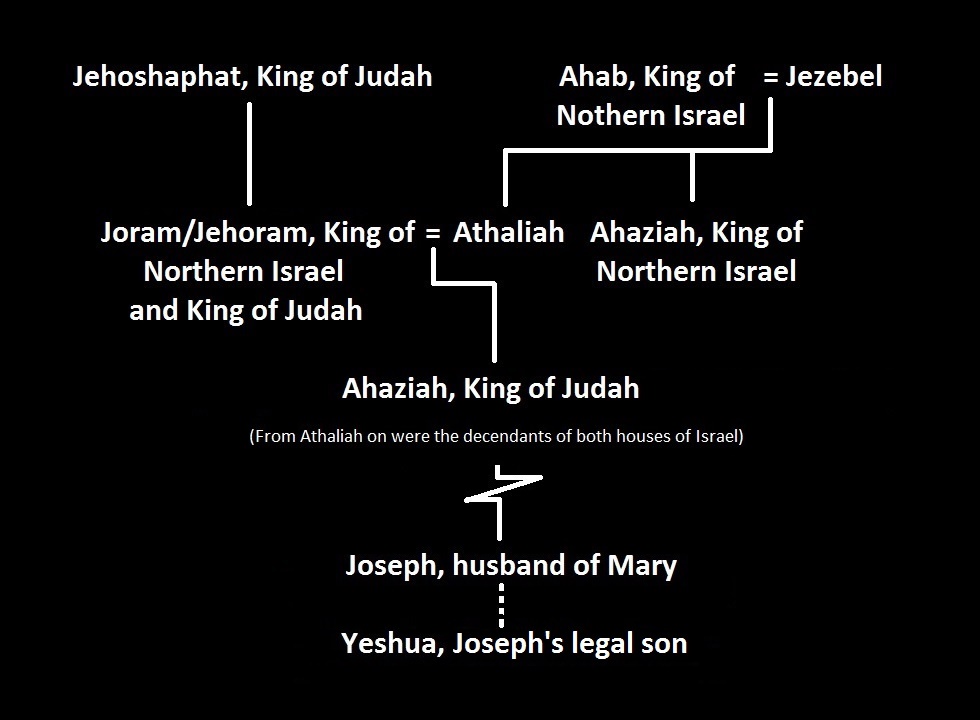
I pray that this teaching has been an eye opener to everyone.
Any questions or comments can be sent to
the.aleph-tav.project@msn.com
SHALOM
_______________________________________________________________________________________________________________________________________________________________________________
_______________________________________________________________________________________________________________________________________________________________________________
Copyright 2014 The Aleph-Tav Project - NVU's Website Design Software by The Premier Group